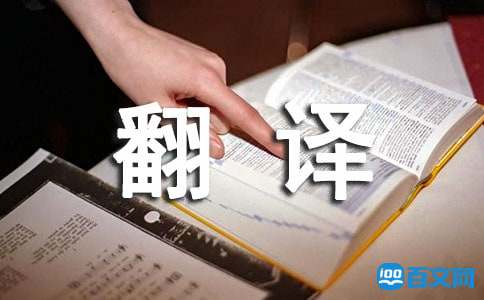2017年英语四级关于元宵节的翻译练习
每年农历的正月十五日,春节刚过,迎来的就是中国的传统节日--元宵节。下面是小编整理的关于元宵节的英语四级翻译练习,大家可以参考参考。

元宵节
与大多数中国节日一样,元宵节同样有自己的特色小吃,成为“汤圆”(也叫“元宵”)。汤圆外形圆圆的,外皮由糯米制成,内陷或甜或辣。人们都说汤圆有两个象征之意,一为农历的第一个月圆,二为家庭团聚圆满。元宵节传统习俗中还有一部分是关于猜灯谜的游戏。在过去,这些谜语大多出自于模糊的文学典故和中国古典文学之中,所以猜灯谜以前多为知识份子的“领地”。踩高跷,敲大鼓和舞龙狮也是元宵节主要的娱乐活动。
参考翻译:
Like most Chinese festivals, the Lantern Festival has its own special food, called “tang yuan”. These are round, glutinous rice dumplings with sweet or spicy fillings. The dumplings are said to symbolize both the first full moon and family utility and completeness. Part of the lantern festival tradition involves a game to guess riddles attached to the lanterns. In the old days the riddles were obscure literary allusions to the Chinese classics and so were mainly the preserve of the educated classes. Stilt-walking, drumming and dragon and lion dancing are the main entertainment forms of the Lantern Festival.
元宵节介绍
每年农历的正月十五日,春节刚过,迎来的就是中国的传统节日--元宵节。元宵主要的活动就是看灯。东汉明帝时期,明帝提倡佛教,听说佛教有正月十五日僧人观佛舍利,点灯敬佛的做法,就命令这一天夜晚在皇宫和寺庙里点灯敬佛,令士族庶民都挂灯。以后这种佛教礼仪节日逐渐形成民间盛大的节日。该节经历了由宫廷到民间,由中原到全国的发展过程。
直到今天,元宵点灯的`习俗仍然在中国的各地流传的,各式各样美丽的花灯在这一天都会点亮,孩子们提着自制的灯笼走街串巷,非常高兴。猜灯谜也是元宵节的一项重要活动,花灯的主人会将谜面写在灯笼上,挂在门口,如果有人可以猜中,就能得到小小的礼物。这项活动最早起源于宋朝,因为谜语能启迪智慧又饶有兴趣,所以流传过程中深受社会各阶层的欢迎。
民间过元宵节吃元宵的习俗。元宵由糯米制成,或实心,或带馅。馅有豆沙、白糖、山楂、各类果料等,食用时煮、煎、蒸、炸皆可。起初,人们把这种食物叫“浮圆子”,后来又叫“汤团”或“汤圆”,这些名称“团圆”字音相近,取团圆之意,象征全家人团团圆圆,和睦幸福,人们也以此怀念离别的亲人,寄托了对未来生活的美好愿望。
随着时间的推移,元宵节的活动越来越多,白天有耍龙灯、耍狮子、踩高跷、划旱船扭秧歌、打太平鼓等传统民俗表演。到了夜晚,除了五颜六色的美花灯之外,还有艳丽多姿的烟火。大多数家庭会在春节时留下一些烟花等到元宵节这天燃放,而一些地方政府也会举办烟花大会,当新年的第一个月圆之夜在盛大的烟火表演中来临时,人们都陶醉在这令人难忘了烟花与皎洁的明月中。
译文:
The Lantern Festival falls on the 15th day of the 1st lunar month, usually in February or March in the Gregorian calendar. As early as the Western Han Dynasty (206 BC-AD 25), it had become a festival with great significance. This day's important activity is watching lanterns. Throughout the Han Dynasty (206 BC-AD 220), Buddhism flourished in China. One emperor heard that Buddhist monks would watch sarira, or remains from the cremation of Buddha's body, and light lanterns to worship Buddha on the 15th day of the 1st lunar month, so he ordered to light lanterns in the imperial palace and temples to show respect to Buddha on this day. Later, the Buddhist rite developed into a grand festival among common people and its influence expanded from the Central Plains to the whole of China.
Till today, the lantern festival is still held each year around the country. Lanterns of various shapes and sizes are hung in the streets, attracting countless visitors. Children will hold self-made or bought lanterns to stroll with on the streets, extremely excited. "Guessing lantern riddles"is an essential part of the Festival. Lantern owners write riddles on a piece of paper and post them on the lanterns. If visitors have solutions to the riddles, they can pull the paper out and go to the lantern owners to check their answer. If they are right, they will get a little gift. The activity emerged during people's enjoyment of lanterns in the Song Dynasty (960-1279). As riddle guessing is interesting and full of wisdom, it has become popular among all social strata.
People will eat yuanxiao, or rice dumplings, on this day, so it is also called the "Yuanxiao Festival."Yuanxiao also has another name, tangyuan. It is small dumpling balls made of glutinous rice flour with rose petals, sesame, bean paste, jujube paste, walnut meat, dried fruit, sugar and edible oil as filling. Tangyuan can be boiled, fried or steamed. It tastes sweet and delicious. What’s more, tangyuan in Chinese has a similar pronunciation with "tuanyuan”, meaning reunion. So people eat them to denote union, harmony and happiness for the family.
In the daytime of the Festival, performances such as a dragon lantern dance, a lion dance, a land boat dance, a yangge dance, walking on stilts and beating drums while dancing will be staged. On the night, except for magnificent lanterns, fireworks form a beautiful scene. Most families spare some fireworks from the Spring Festival and let them off in the Lantern Festival. Some local governments will even organize a fireworks party. On the night when the first full moon enters the New Year, people become really intoxicated by the imposing fireworks and bright moon in the sky.
灯谜
灯谜(lantern riddles )是指写在彩灯上面的谜语。灯谜一般由三部分组成,即谜面、谜目(hint)和谜底。在灯谜中凡是谜面上有的字,在谜底中不能再出现。 灯谜里充满着智慧,因此猜谜底显得很有趣,这也使得猜灯谜成为元宵节的一项不可缺少的活动。灯谜在中国源远流长,可以毫不夸张地说,灯谜体现着中国人民无穷的智慧。
参考翻译:
Lantern riddles are riddles that are written on thelanterns. Generally, a lantern riddle consists of threeparts, namely the riddle, the hint and the answer.Any character that appears in the riddle cannot bein the answer again. Lantern riddles are full of wisdom, thus working out them can be muchfun, which makes guessing riddles an essential part of the activities in the Lantern Festival.The lantern riddle has a long history in China, and it is no exaggeration to say that it is areflection of infinite wisdom of the Chinese people.
1.由…组成:可以译为consist of,也可译为be made up of或becomposed of。
2.谜面、谜目和谜底:这三个词如果理解不当就会翻译错误。谜面是该条谜语的主题,也就是灯谜本身;谜目则是附加于谜面之后,为猜谜者划定猜谜范围的提示性语言;谜底即是正确答案。所以可译为the riddle,the hint and theanswer。
3.不可缺少的:可译为essential或indispensable。其所在句其实包含了两重因果关系,翻译时,前面第一重因果关系可用简单的thus来体现,后面可用which引导的非限制性定语从句来体现。
4.可以毫不夸张地说:有固定译法,即it is no exaggeration to say。
5.体现着:根据汉语中多动词而英语中多用名词的习惯,可以把词性转译成名词,即 a reflection of...
【2017年英语四级关于元宵节的翻译练习】相关文章: